HA3042 Taxation Law T2 2018 Individual Assignment Solution
VerifiedAdded on 2023/06/08
|10
|3132
|199
Homework Assignment
AI Summary
This document presents a comprehensive solution to an HA3042 Taxation Law assignment. It begins by addressing the taxability of lottery winnings under Australian law, specifically focusing on annual payment income from a 'Set for Life' lottery and the implications of the winner's death. The solution then analyzes the tax implications for Corner Pharmacy, a chemist shop operating under the Pharmaceutical Benefits Scheme (PBS), providing a detailed computation of taxable income, including working notes. The assignment further delves into the case of IRC v. Duke of Westminster, examining tax avoidance schemes and their relevance in the Australian context. Finally, it addresses the taxation of losses and profits from a jointly owned leasing property, considering the unequal income and loss allocation between the joint tenants, and the treatment of capital gains or losses upon property sale. The solution incorporates relevant legal provisions, case analysis, and financial calculations to provide a clear understanding of the taxation principles involved.
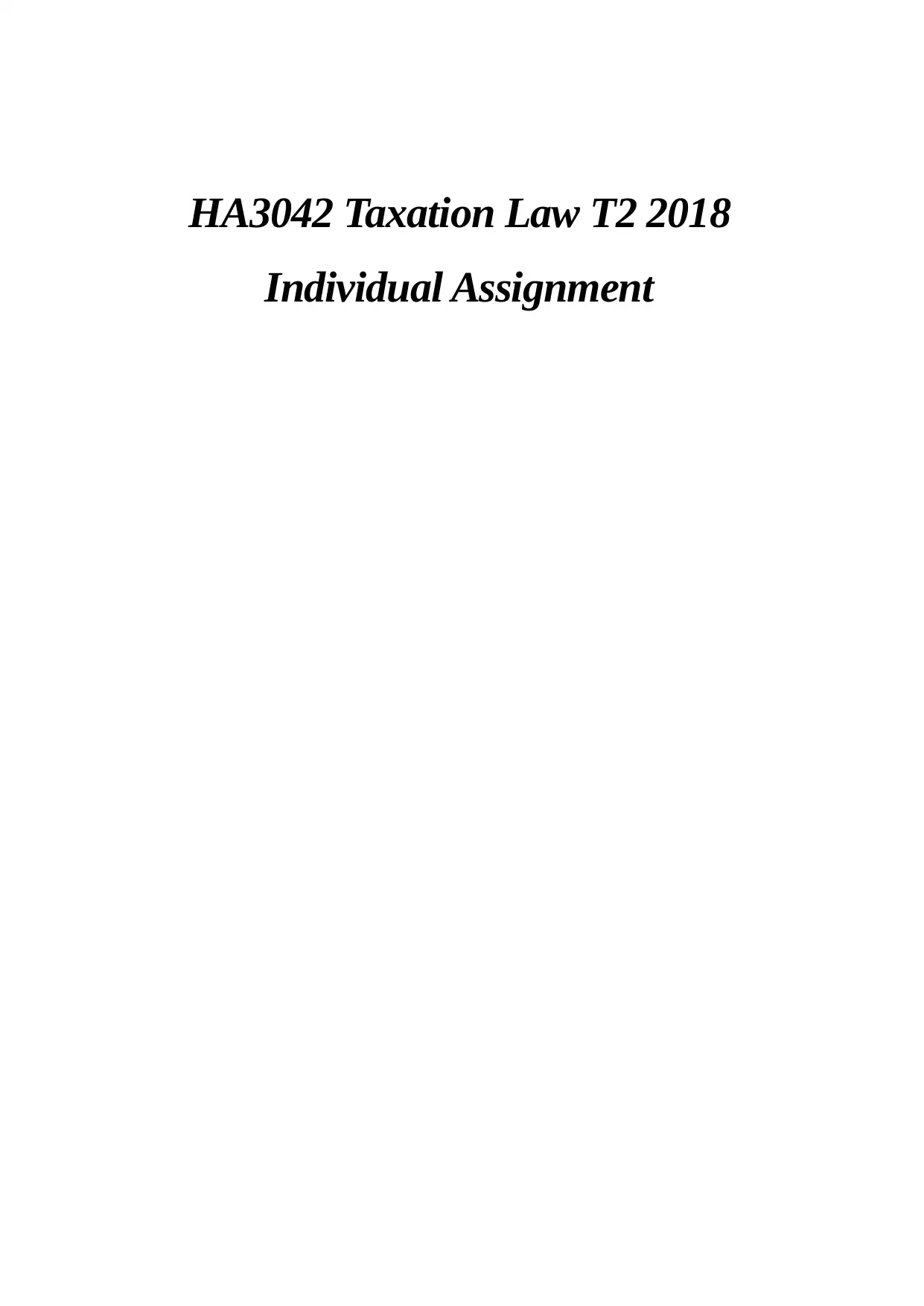
HA3042 Taxation Law T2 2018
Individual Assignment
Individual Assignment
Paraphrase This Document
Need a fresh take? Get an instant paraphrase of this document with our AI Paraphraser

TABLE OF CONTENTS
Question 1..................................................................................................................................3
Question 2..................................................................................................................................3
Question 3..................................................................................................................................3
Question 4..................................................................................................................................3
References..................................................................................................................................4
Question 1..................................................................................................................................3
Question 2..................................................................................................................................3
Question 3..................................................................................................................................3
Question 4..................................................................................................................................3
References..................................................................................................................................4
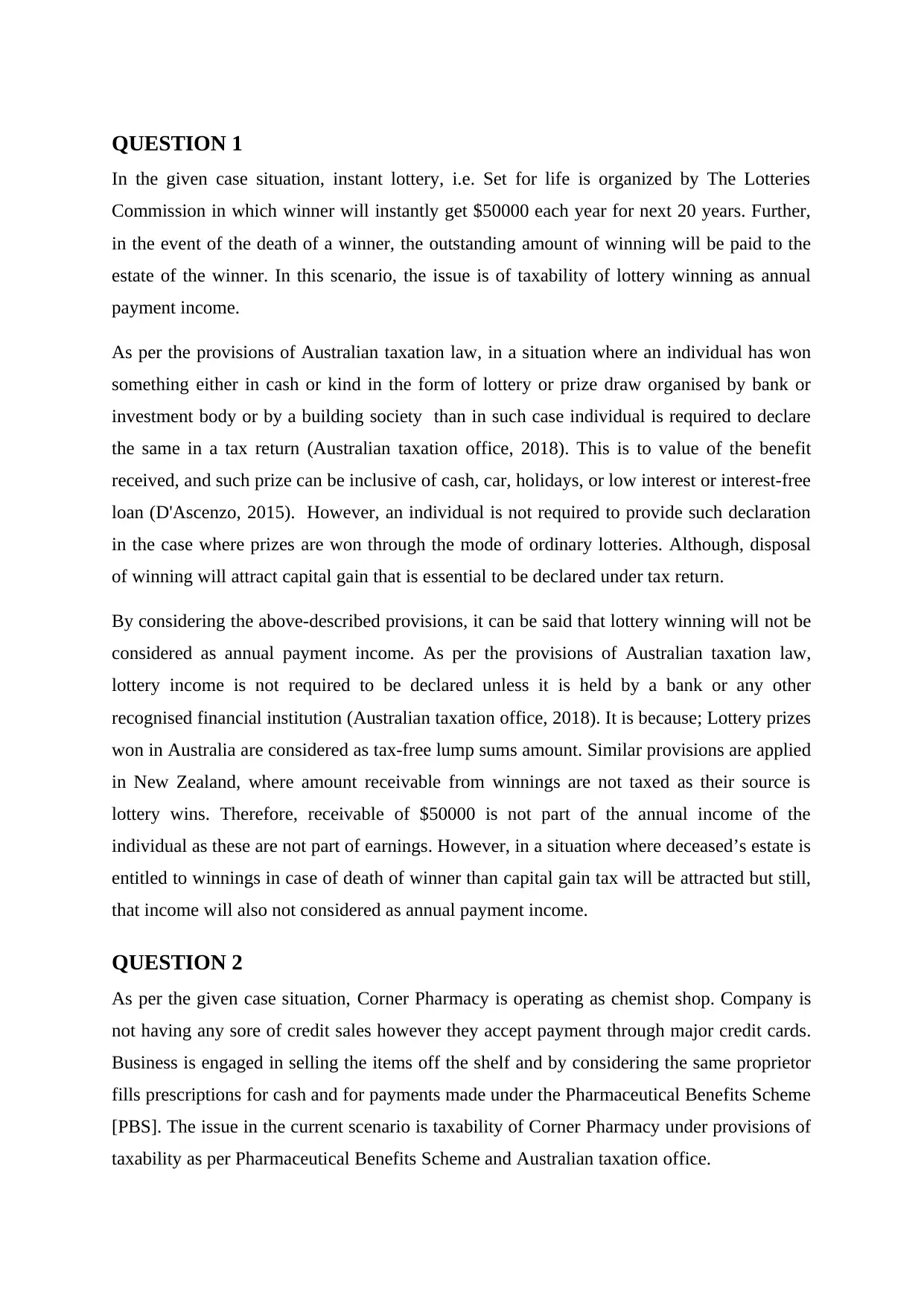
QUESTION 1
In the given case situation, instant lottery, i.e. Set for life is organized by The Lotteries
Commission in which winner will instantly get $50000 each year for next 20 years. Further,
in the event of the death of a winner, the outstanding amount of winning will be paid to the
estate of the winner. In this scenario, the issue is of taxability of lottery winning as annual
payment income.
As per the provisions of Australian taxation law, in a situation where an individual has won
something either in cash or kind in the form of lottery or prize draw organised by bank or
investment body or by a building society than in such case individual is required to declare
the same in a tax return (Australian taxation office, 2018). This is to value of the benefit
received, and such prize can be inclusive of cash, car, holidays, or low interest or interest-free
loan (D'Ascenzo, 2015). However, an individual is not required to provide such declaration
in the case where prizes are won through the mode of ordinary lotteries. Although, disposal
of winning will attract capital gain that is essential to be declared under tax return.
By considering the above-described provisions, it can be said that lottery winning will not be
considered as annual payment income. As per the provisions of Australian taxation law,
lottery income is not required to be declared unless it is held by a bank or any other
recognised financial institution (Australian taxation office, 2018). It is because; Lottery prizes
won in Australia are considered as tax-free lump sums amount. Similar provisions are applied
in New Zealand, where amount receivable from winnings are not taxed as their source is
lottery wins. Therefore, receivable of $50000 is not part of the annual income of the
individual as these are not part of earnings. However, in a situation where deceased’s estate is
entitled to winnings in case of death of winner than capital gain tax will be attracted but still,
that income will also not considered as annual payment income.
QUESTION 2
As per the given case situation, Corner Pharmacy is operating as chemist shop. Company is
not having any sore of credit sales however they accept payment through major credit cards.
Business is engaged in selling the items off the shelf and by considering the same proprietor
fills prescriptions for cash and for payments made under the Pharmaceutical Benefits Scheme
[PBS]. The issue in the current scenario is taxability of Corner Pharmacy under provisions of
taxability as per Pharmaceutical Benefits Scheme and Australian taxation office.
In the given case situation, instant lottery, i.e. Set for life is organized by The Lotteries
Commission in which winner will instantly get $50000 each year for next 20 years. Further,
in the event of the death of a winner, the outstanding amount of winning will be paid to the
estate of the winner. In this scenario, the issue is of taxability of lottery winning as annual
payment income.
As per the provisions of Australian taxation law, in a situation where an individual has won
something either in cash or kind in the form of lottery or prize draw organised by bank or
investment body or by a building society than in such case individual is required to declare
the same in a tax return (Australian taxation office, 2018). This is to value of the benefit
received, and such prize can be inclusive of cash, car, holidays, or low interest or interest-free
loan (D'Ascenzo, 2015). However, an individual is not required to provide such declaration
in the case where prizes are won through the mode of ordinary lotteries. Although, disposal
of winning will attract capital gain that is essential to be declared under tax return.
By considering the above-described provisions, it can be said that lottery winning will not be
considered as annual payment income. As per the provisions of Australian taxation law,
lottery income is not required to be declared unless it is held by a bank or any other
recognised financial institution (Australian taxation office, 2018). It is because; Lottery prizes
won in Australia are considered as tax-free lump sums amount. Similar provisions are applied
in New Zealand, where amount receivable from winnings are not taxed as their source is
lottery wins. Therefore, receivable of $50000 is not part of the annual income of the
individual as these are not part of earnings. However, in a situation where deceased’s estate is
entitled to winnings in case of death of winner than capital gain tax will be attracted but still,
that income will also not considered as annual payment income.
QUESTION 2
As per the given case situation, Corner Pharmacy is operating as chemist shop. Company is
not having any sore of credit sales however they accept payment through major credit cards.
Business is engaged in selling the items off the shelf and by considering the same proprietor
fills prescriptions for cash and for payments made under the Pharmaceutical Benefits Scheme
[PBS]. The issue in the current scenario is taxability of Corner Pharmacy under provisions of
taxability as per Pharmaceutical Benefits Scheme and Australian taxation office.
⊘ This is a preview!⊘
Do you want full access?
Subscribe today to unlock all pages.

Trusted by 1+ million students worldwide
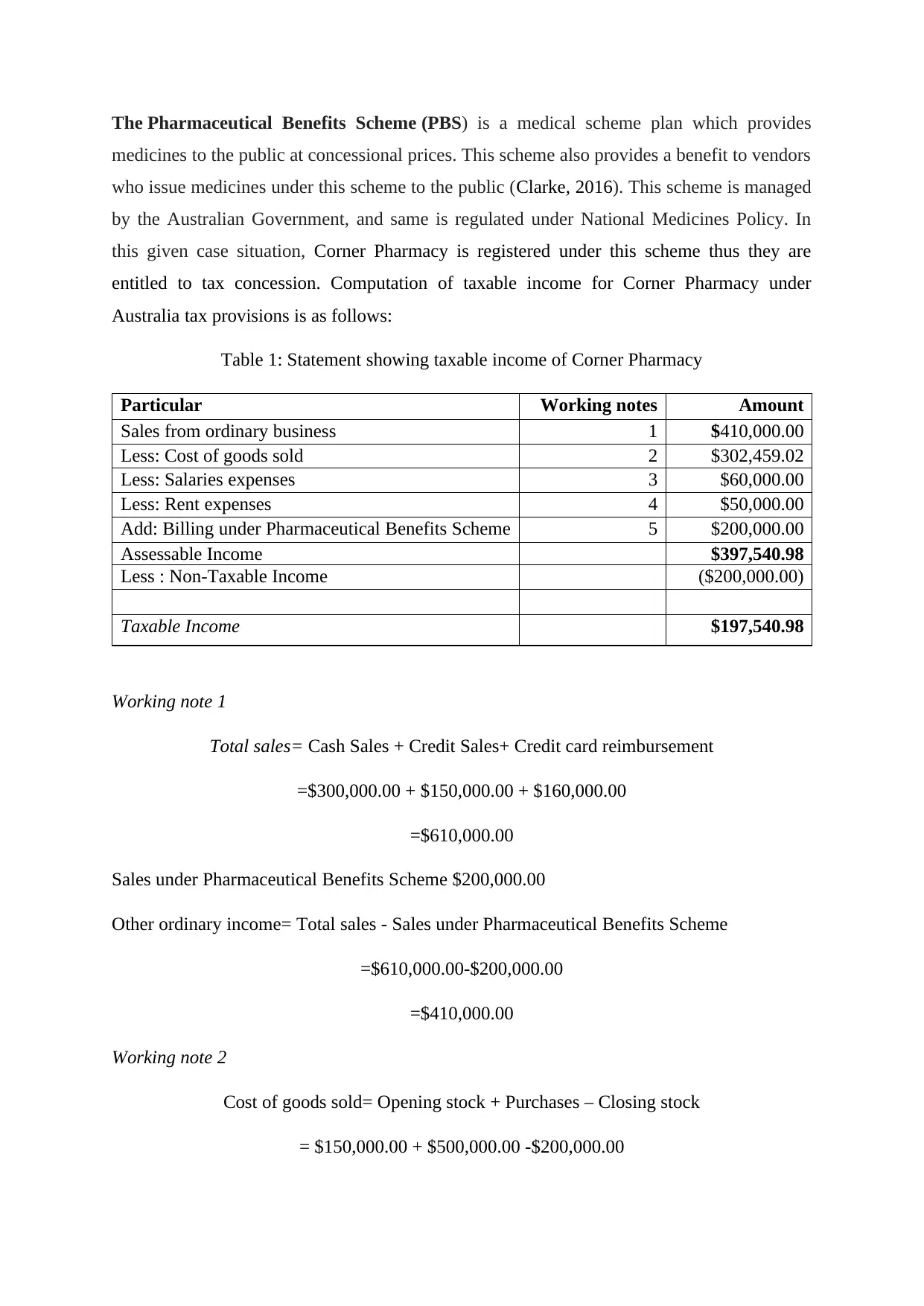
The Pharmaceutical Benefits Scheme (PBS) is a medical scheme plan which provides
medicines to the public at concessional prices. This scheme also provides a benefit to vendors
who issue medicines under this scheme to the public (Clarke, 2016). This scheme is managed
by the Australian Government, and same is regulated under National Medicines Policy. In
this given case situation, Corner Pharmacy is registered under this scheme thus they are
entitled to tax concession. Computation of taxable income for Corner Pharmacy under
Australia tax provisions is as follows:
Table 1: Statement showing taxable income of Corner Pharmacy
Particular Working notes Amount
Sales from ordinary business 1 $410,000.00
Less: Cost of goods sold 2 $302,459.02
Less: Salaries expenses 3 $60,000.00
Less: Rent expenses 4 $50,000.00
Add: Billing under Pharmaceutical Benefits Scheme 5 $200,000.00
Assessable Income $397,540.98
Less : Non-Taxable Income ($200,000.00)
Taxable Income $197,540.98
Working note 1
Total sales= Cash Sales + Credit Sales+ Credit card reimbursement
=$300,000.00 + $150,000.00 + $160,000.00
=$610,000.00
Sales under Pharmaceutical Benefits Scheme $200,000.00
Other ordinary income= Total sales - Sales under Pharmaceutical Benefits Scheme
=$610,000.00-$200,000.00
=$410,000.00
Working note 2
Cost of goods sold= Opening stock + Purchases – Closing stock
= $150,000.00 + $500,000.00 -$200,000.00
medicines to the public at concessional prices. This scheme also provides a benefit to vendors
who issue medicines under this scheme to the public (Clarke, 2016). This scheme is managed
by the Australian Government, and same is regulated under National Medicines Policy. In
this given case situation, Corner Pharmacy is registered under this scheme thus they are
entitled to tax concession. Computation of taxable income for Corner Pharmacy under
Australia tax provisions is as follows:
Table 1: Statement showing taxable income of Corner Pharmacy
Particular Working notes Amount
Sales from ordinary business 1 $410,000.00
Less: Cost of goods sold 2 $302,459.02
Less: Salaries expenses 3 $60,000.00
Less: Rent expenses 4 $50,000.00
Add: Billing under Pharmaceutical Benefits Scheme 5 $200,000.00
Assessable Income $397,540.98
Less : Non-Taxable Income ($200,000.00)
Taxable Income $197,540.98
Working note 1
Total sales= Cash Sales + Credit Sales+ Credit card reimbursement
=$300,000.00 + $150,000.00 + $160,000.00
=$610,000.00
Sales under Pharmaceutical Benefits Scheme $200,000.00
Other ordinary income= Total sales - Sales under Pharmaceutical Benefits Scheme
=$610,000.00-$200,000.00
=$410,000.00
Working note 2
Cost of goods sold= Opening stock + Purchases – Closing stock
= $150,000.00 + $500,000.00 -$200,000.00
Paraphrase This Document
Need a fresh take? Get an instant paraphrase of this document with our AI Paraphraser
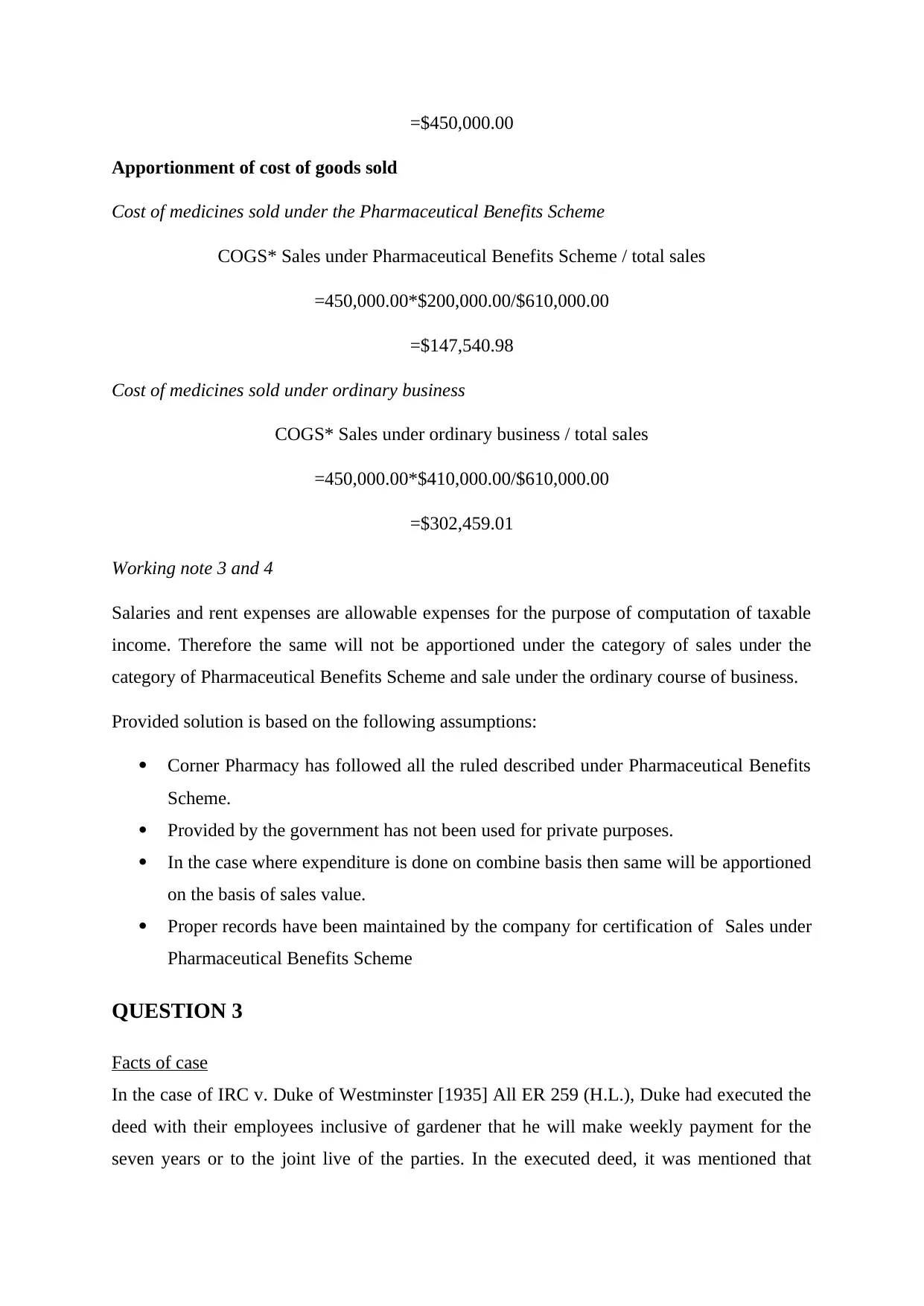
=$450,000.00
Apportionment of cost of goods sold
Cost of medicines sold under the Pharmaceutical Benefits Scheme
COGS* Sales under Pharmaceutical Benefits Scheme / total sales
=450,000.00*$200,000.00/$610,000.00
=$147,540.98
Cost of medicines sold under ordinary business
COGS* Sales under ordinary business / total sales
=450,000.00*$410,000.00/$610,000.00
=$302,459.01
Working note 3 and 4
Salaries and rent expenses are allowable expenses for the purpose of computation of taxable
income. Therefore the same will not be apportioned under the category of sales under the
category of Pharmaceutical Benefits Scheme and sale under the ordinary course of business.
Provided solution is based on the following assumptions:
Corner Pharmacy has followed all the ruled described under Pharmaceutical Benefits
Scheme.
Provided by the government has not been used for private purposes.
In the case where expenditure is done on combine basis then same will be apportioned
on the basis of sales value.
Proper records have been maintained by the company for certification of Sales under
Pharmaceutical Benefits Scheme
QUESTION 3
Facts of case
In the case of IRC v. Duke of Westminster [1935] All ER 259 (H.L.), Duke had executed the
deed with their employees inclusive of gardener that he will make weekly payment for the
seven years or to the joint live of the parties. In the executed deed, it was mentioned that
Apportionment of cost of goods sold
Cost of medicines sold under the Pharmaceutical Benefits Scheme
COGS* Sales under Pharmaceutical Benefits Scheme / total sales
=450,000.00*$200,000.00/$610,000.00
=$147,540.98
Cost of medicines sold under ordinary business
COGS* Sales under ordinary business / total sales
=450,000.00*$410,000.00/$610,000.00
=$302,459.01
Working note 3 and 4
Salaries and rent expenses are allowable expenses for the purpose of computation of taxable
income. Therefore the same will not be apportioned under the category of sales under the
category of Pharmaceutical Benefits Scheme and sale under the ordinary course of business.
Provided solution is based on the following assumptions:
Corner Pharmacy has followed all the ruled described under Pharmaceutical Benefits
Scheme.
Provided by the government has not been used for private purposes.
In the case where expenditure is done on combine basis then same will be apportioned
on the basis of sales value.
Proper records have been maintained by the company for certification of Sales under
Pharmaceutical Benefits Scheme
QUESTION 3
Facts of case
In the case of IRC v. Duke of Westminster [1935] All ER 259 (H.L.), Duke had executed the
deed with their employees inclusive of gardener that he will make weekly payment for the
seven years or to the joint live of the parties. In the executed deed, it was mentioned that
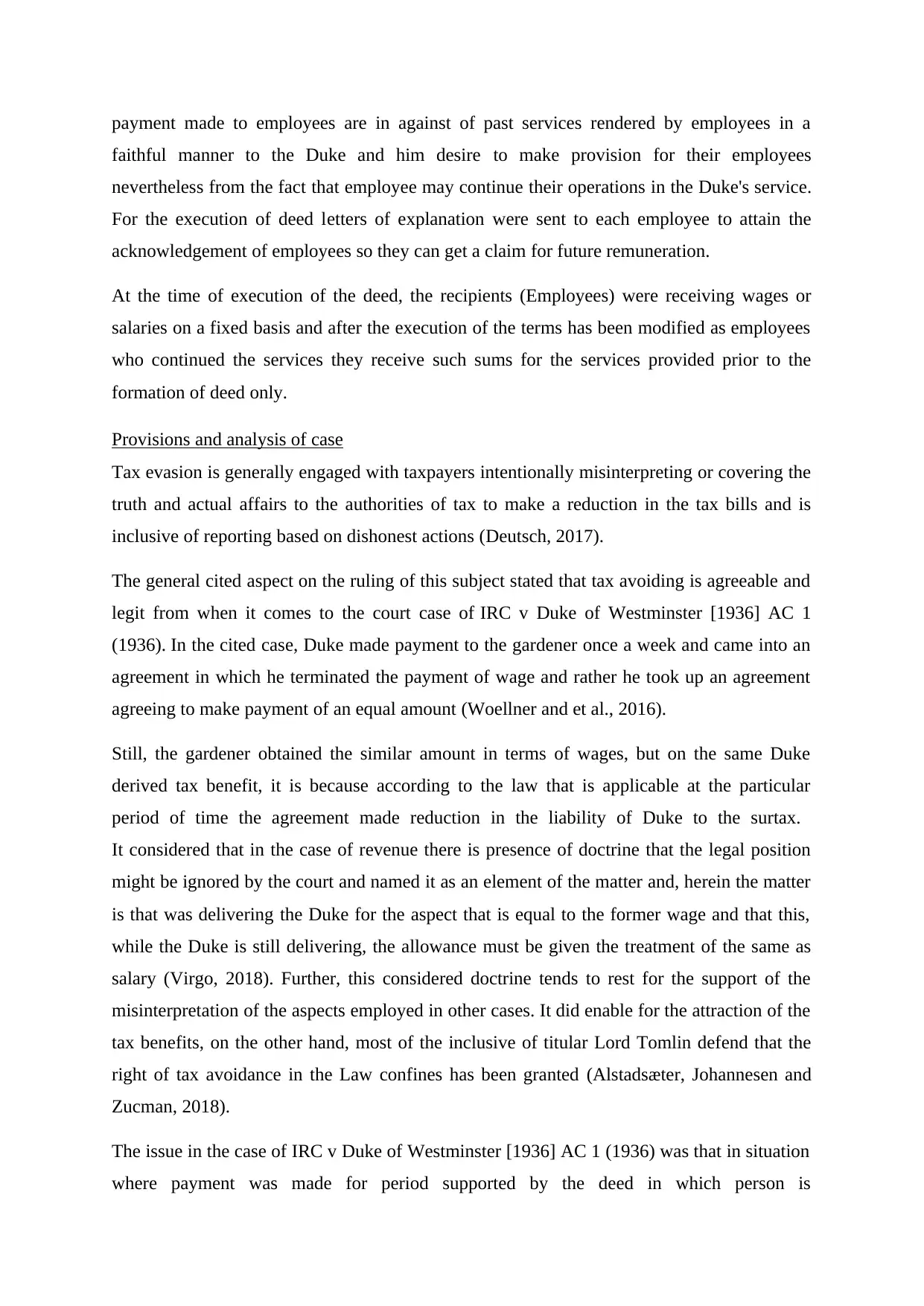
payment made to employees are in against of past services rendered by employees in a
faithful manner to the Duke and him desire to make provision for their employees
nevertheless from the fact that employee may continue their operations in the Duke's service.
For the execution of deed letters of explanation were sent to each employee to attain the
acknowledgement of employees so they can get a claim for future remuneration.
At the time of execution of the deed, the recipients (Employees) were receiving wages or
salaries on a fixed basis and after the execution of the terms has been modified as employees
who continued the services they receive such sums for the services provided prior to the
formation of deed only.
Provisions and analysis of case
Tax evasion is generally engaged with taxpayers intentionally misinterpreting or covering the
truth and actual affairs to the authorities of tax to make a reduction in the tax bills and is
inclusive of reporting based on dishonest actions (Deutsch, 2017).
The general cited aspect on the ruling of this subject stated that tax avoiding is agreeable and
legit from when it comes to the court case of IRC v Duke of Westminster [1936] AC 1
(1936). In the cited case, Duke made payment to the gardener once a week and came into an
agreement in which he terminated the payment of wage and rather he took up an agreement
agreeing to make payment of an equal amount (Woellner and et al., 2016).
Still, the gardener obtained the similar amount in terms of wages, but on the same Duke
derived tax benefit, it is because according to the law that is applicable at the particular
period of time the agreement made reduction in the liability of Duke to the surtax.
It considered that in the case of revenue there is presence of doctrine that the legal position
might be ignored by the court and named it as an element of the matter and, herein the matter
is that was delivering the Duke for the aspect that is equal to the former wage and that this,
while the Duke is still delivering, the allowance must be given the treatment of the same as
salary (Virgo, 2018). Further, this considered doctrine tends to rest for the support of the
misinterpretation of the aspects employed in other cases. It did enable for the attraction of the
tax benefits, on the other hand, most of the inclusive of titular Lord Tomlin defend that the
right of tax avoidance in the Law confines has been granted (Alstadsæter, Johannesen and
Zucman, 2018).
The issue in the case of IRC v Duke of Westminster [1936] AC 1 (1936) was that in situation
where payment was made for period supported by the deed in which person is
faithful manner to the Duke and him desire to make provision for their employees
nevertheless from the fact that employee may continue their operations in the Duke's service.
For the execution of deed letters of explanation were sent to each employee to attain the
acknowledgement of employees so they can get a claim for future remuneration.
At the time of execution of the deed, the recipients (Employees) were receiving wages or
salaries on a fixed basis and after the execution of the terms has been modified as employees
who continued the services they receive such sums for the services provided prior to the
formation of deed only.
Provisions and analysis of case
Tax evasion is generally engaged with taxpayers intentionally misinterpreting or covering the
truth and actual affairs to the authorities of tax to make a reduction in the tax bills and is
inclusive of reporting based on dishonest actions (Deutsch, 2017).
The general cited aspect on the ruling of this subject stated that tax avoiding is agreeable and
legit from when it comes to the court case of IRC v Duke of Westminster [1936] AC 1
(1936). In the cited case, Duke made payment to the gardener once a week and came into an
agreement in which he terminated the payment of wage and rather he took up an agreement
agreeing to make payment of an equal amount (Woellner and et al., 2016).
Still, the gardener obtained the similar amount in terms of wages, but on the same Duke
derived tax benefit, it is because according to the law that is applicable at the particular
period of time the agreement made reduction in the liability of Duke to the surtax.
It considered that in the case of revenue there is presence of doctrine that the legal position
might be ignored by the court and named it as an element of the matter and, herein the matter
is that was delivering the Duke for the aspect that is equal to the former wage and that this,
while the Duke is still delivering, the allowance must be given the treatment of the same as
salary (Virgo, 2018). Further, this considered doctrine tends to rest for the support of the
misinterpretation of the aspects employed in other cases. It did enable for the attraction of the
tax benefits, on the other hand, most of the inclusive of titular Lord Tomlin defend that the
right of tax avoidance in the Law confines has been granted (Alstadsæter, Johannesen and
Zucman, 2018).
The issue in the case of IRC v Duke of Westminster [1936] AC 1 (1936) was that in situation
where payment was made for period supported by the deed in which person is
⊘ This is a preview!⊘
Do you want full access?
Subscribe today to unlock all pages.

Trusted by 1+ million students worldwide
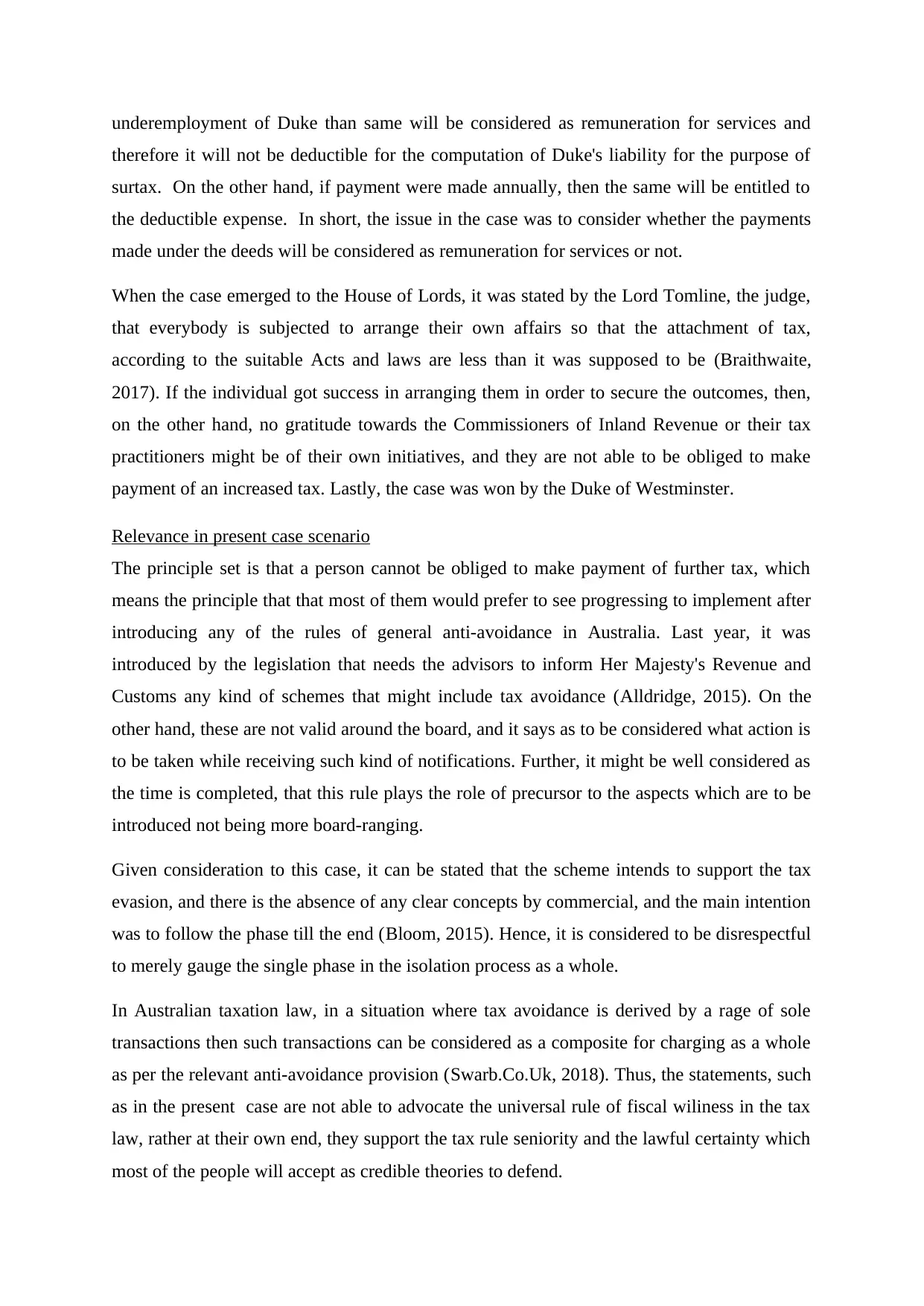
underemployment of Duke than same will be considered as remuneration for services and
therefore it will not be deductible for the computation of Duke's liability for the purpose of
surtax. On the other hand, if payment were made annually, then the same will be entitled to
the deductible expense. In short, the issue in the case was to consider whether the payments
made under the deeds will be considered as remuneration for services or not.
When the case emerged to the House of Lords, it was stated by the Lord Tomline, the judge,
that everybody is subjected to arrange their own affairs so that the attachment of tax,
according to the suitable Acts and laws are less than it was supposed to be (Braithwaite,
2017). If the individual got success in arranging them in order to secure the outcomes, then,
on the other hand, no gratitude towards the Commissioners of Inland Revenue or their tax
practitioners might be of their own initiatives, and they are not able to be obliged to make
payment of an increased tax. Lastly, the case was won by the Duke of Westminster.
Relevance in present case scenario
The principle set is that a person cannot be obliged to make payment of further tax, which
means the principle that that most of them would prefer to see progressing to implement after
introducing any of the rules of general anti-avoidance in Australia. Last year, it was
introduced by the legislation that needs the advisors to inform Her Majesty's Revenue and
Customs any kind of schemes that might include tax avoidance (Alldridge, 2015). On the
other hand, these are not valid around the board, and it says as to be considered what action is
to be taken while receiving such kind of notifications. Further, it might be well considered as
the time is completed, that this rule plays the role of precursor to the aspects which are to be
introduced not being more board-ranging.
Given consideration to this case, it can be stated that the scheme intends to support the tax
evasion, and there is the absence of any clear concepts by commercial, and the main intention
was to follow the phase till the end (Bloom, 2015). Hence, it is considered to be disrespectful
to merely gauge the single phase in the isolation process as a whole.
In Australian taxation law, in a situation where tax avoidance is derived by a rage of sole
transactions then such transactions can be considered as a composite for charging as a whole
as per the relevant anti-avoidance provision (Swarb.Co.Uk, 2018). Thus, the statements, such
as in the present case are not able to advocate the universal rule of fiscal wiliness in the tax
law, rather at their own end, they support the tax rule seniority and the lawful certainty which
most of the people will accept as credible theories to defend.
therefore it will not be deductible for the computation of Duke's liability for the purpose of
surtax. On the other hand, if payment were made annually, then the same will be entitled to
the deductible expense. In short, the issue in the case was to consider whether the payments
made under the deeds will be considered as remuneration for services or not.
When the case emerged to the House of Lords, it was stated by the Lord Tomline, the judge,
that everybody is subjected to arrange their own affairs so that the attachment of tax,
according to the suitable Acts and laws are less than it was supposed to be (Braithwaite,
2017). If the individual got success in arranging them in order to secure the outcomes, then,
on the other hand, no gratitude towards the Commissioners of Inland Revenue or their tax
practitioners might be of their own initiatives, and they are not able to be obliged to make
payment of an increased tax. Lastly, the case was won by the Duke of Westminster.
Relevance in present case scenario
The principle set is that a person cannot be obliged to make payment of further tax, which
means the principle that that most of them would prefer to see progressing to implement after
introducing any of the rules of general anti-avoidance in Australia. Last year, it was
introduced by the legislation that needs the advisors to inform Her Majesty's Revenue and
Customs any kind of schemes that might include tax avoidance (Alldridge, 2015). On the
other hand, these are not valid around the board, and it says as to be considered what action is
to be taken while receiving such kind of notifications. Further, it might be well considered as
the time is completed, that this rule plays the role of precursor to the aspects which are to be
introduced not being more board-ranging.
Given consideration to this case, it can be stated that the scheme intends to support the tax
evasion, and there is the absence of any clear concepts by commercial, and the main intention
was to follow the phase till the end (Bloom, 2015). Hence, it is considered to be disrespectful
to merely gauge the single phase in the isolation process as a whole.
In Australian taxation law, in a situation where tax avoidance is derived by a rage of sole
transactions then such transactions can be considered as a composite for charging as a whole
as per the relevant anti-avoidance provision (Swarb.Co.Uk, 2018). Thus, the statements, such
as in the present case are not able to advocate the universal rule of fiscal wiliness in the tax
law, rather at their own end, they support the tax rule seniority and the lawful certainty which
most of the people will accept as credible theories to defend.
Paraphrase This Document
Need a fresh take? Get an instant paraphrase of this document with our AI Paraphraser
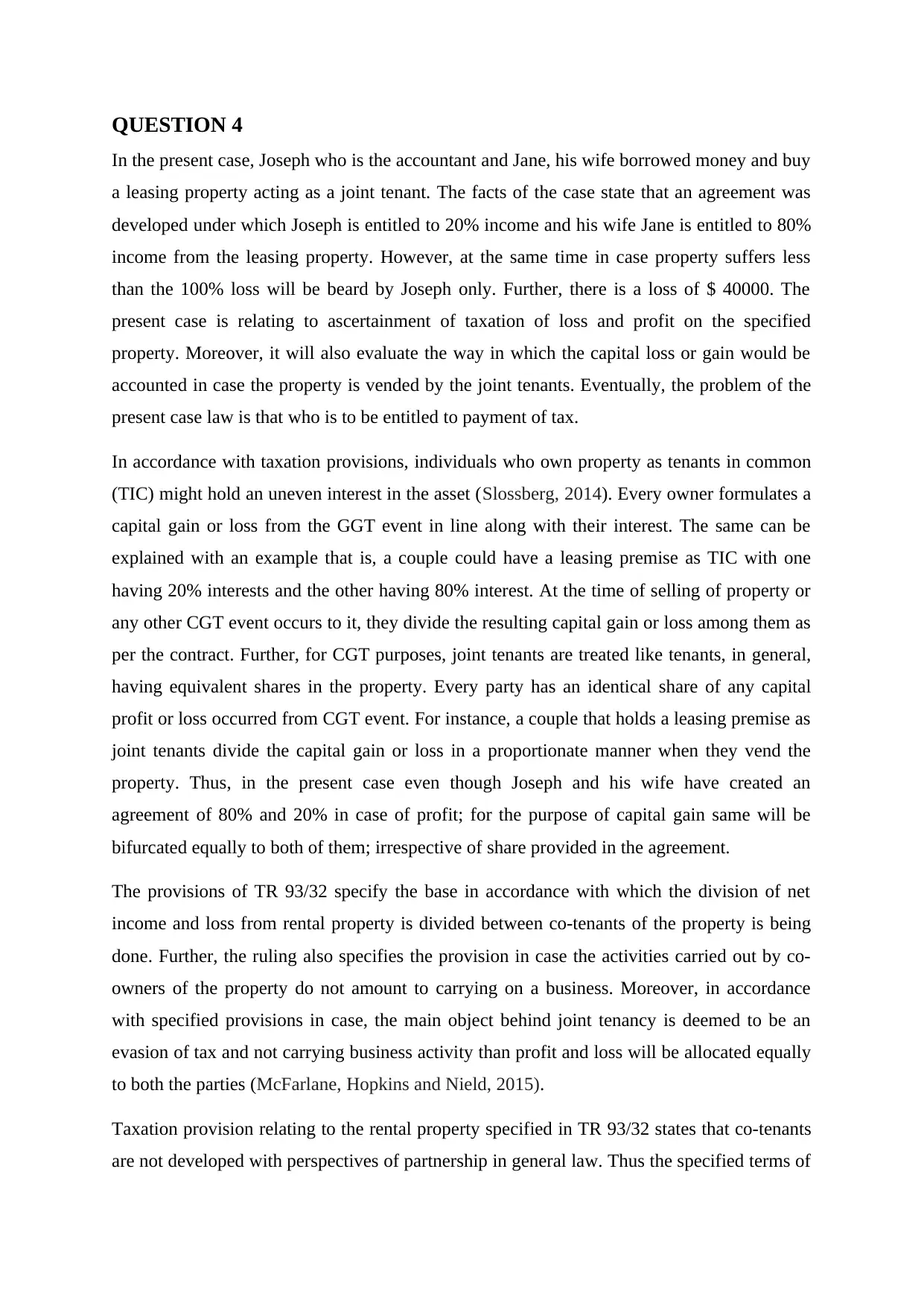
QUESTION 4
In the present case, Joseph who is the accountant and Jane, his wife borrowed money and buy
a leasing property acting as a joint tenant. The facts of the case state that an agreement was
developed under which Joseph is entitled to 20% income and his wife Jane is entitled to 80%
income from the leasing property. However, at the same time in case property suffers less
than the 100% loss will be beard by Joseph only. Further, there is a loss of $ 40000. The
present case is relating to ascertainment of taxation of loss and profit on the specified
property. Moreover, it will also evaluate the way in which the capital loss or gain would be
accounted in case the property is vended by the joint tenants. Eventually, the problem of the
present case law is that who is to be entitled to payment of tax.
In accordance with taxation provisions, individuals who own property as tenants in common
(TIC) might hold an uneven interest in the asset (Slossberg, 2014). Every owner formulates a
capital gain or loss from the GGT event in line along with their interest. The same can be
explained with an example that is, a couple could have a leasing premise as TIC with one
having 20% interests and the other having 80% interest. At the time of selling of property or
any other CGT event occurs to it, they divide the resulting capital gain or loss among them as
per the contract. Further, for CGT purposes, joint tenants are treated like tenants, in general,
having equivalent shares in the property. Every party has an identical share of any capital
profit or loss occurred from CGT event. For instance, a couple that holds a leasing premise as
joint tenants divide the capital gain or loss in a proportionate manner when they vend the
property. Thus, in the present case even though Joseph and his wife have created an
agreement of 80% and 20% in case of profit; for the purpose of capital gain same will be
bifurcated equally to both of them; irrespective of share provided in the agreement.
The provisions of TR 93/32 specify the base in accordance with which the division of net
income and loss from rental property is divided between co-tenants of the property is being
done. Further, the ruling also specifies the provision in case the activities carried out by co-
owners of the property do not amount to carrying on a business. Moreover, in accordance
with specified provisions in case, the main object behind joint tenancy is deemed to be an
evasion of tax and not carrying business activity than profit and loss will be allocated equally
to both the parties (McFarlane, Hopkins and Nield, 2015).
Taxation provision relating to the rental property specified in TR 93/32 states that co-tenants
are not developed with perspectives of partnership in general law. Thus the specified terms of
In the present case, Joseph who is the accountant and Jane, his wife borrowed money and buy
a leasing property acting as a joint tenant. The facts of the case state that an agreement was
developed under which Joseph is entitled to 20% income and his wife Jane is entitled to 80%
income from the leasing property. However, at the same time in case property suffers less
than the 100% loss will be beard by Joseph only. Further, there is a loss of $ 40000. The
present case is relating to ascertainment of taxation of loss and profit on the specified
property. Moreover, it will also evaluate the way in which the capital loss or gain would be
accounted in case the property is vended by the joint tenants. Eventually, the problem of the
present case law is that who is to be entitled to payment of tax.
In accordance with taxation provisions, individuals who own property as tenants in common
(TIC) might hold an uneven interest in the asset (Slossberg, 2014). Every owner formulates a
capital gain or loss from the GGT event in line along with their interest. The same can be
explained with an example that is, a couple could have a leasing premise as TIC with one
having 20% interests and the other having 80% interest. At the time of selling of property or
any other CGT event occurs to it, they divide the resulting capital gain or loss among them as
per the contract. Further, for CGT purposes, joint tenants are treated like tenants, in general,
having equivalent shares in the property. Every party has an identical share of any capital
profit or loss occurred from CGT event. For instance, a couple that holds a leasing premise as
joint tenants divide the capital gain or loss in a proportionate manner when they vend the
property. Thus, in the present case even though Joseph and his wife have created an
agreement of 80% and 20% in case of profit; for the purpose of capital gain same will be
bifurcated equally to both of them; irrespective of share provided in the agreement.
The provisions of TR 93/32 specify the base in accordance with which the division of net
income and loss from rental property is divided between co-tenants of the property is being
done. Further, the ruling also specifies the provision in case the activities carried out by co-
owners of the property do not amount to carrying on a business. Moreover, in accordance
with specified provisions in case, the main object behind joint tenancy is deemed to be an
evasion of tax and not carrying business activity than profit and loss will be allocated equally
to both the parties (McFarlane, Hopkins and Nield, 2015).
Taxation provision relating to the rental property specified in TR 93/32 states that co-tenants
are not developed with perspectives of partnership in general law. Thus the specified terms of
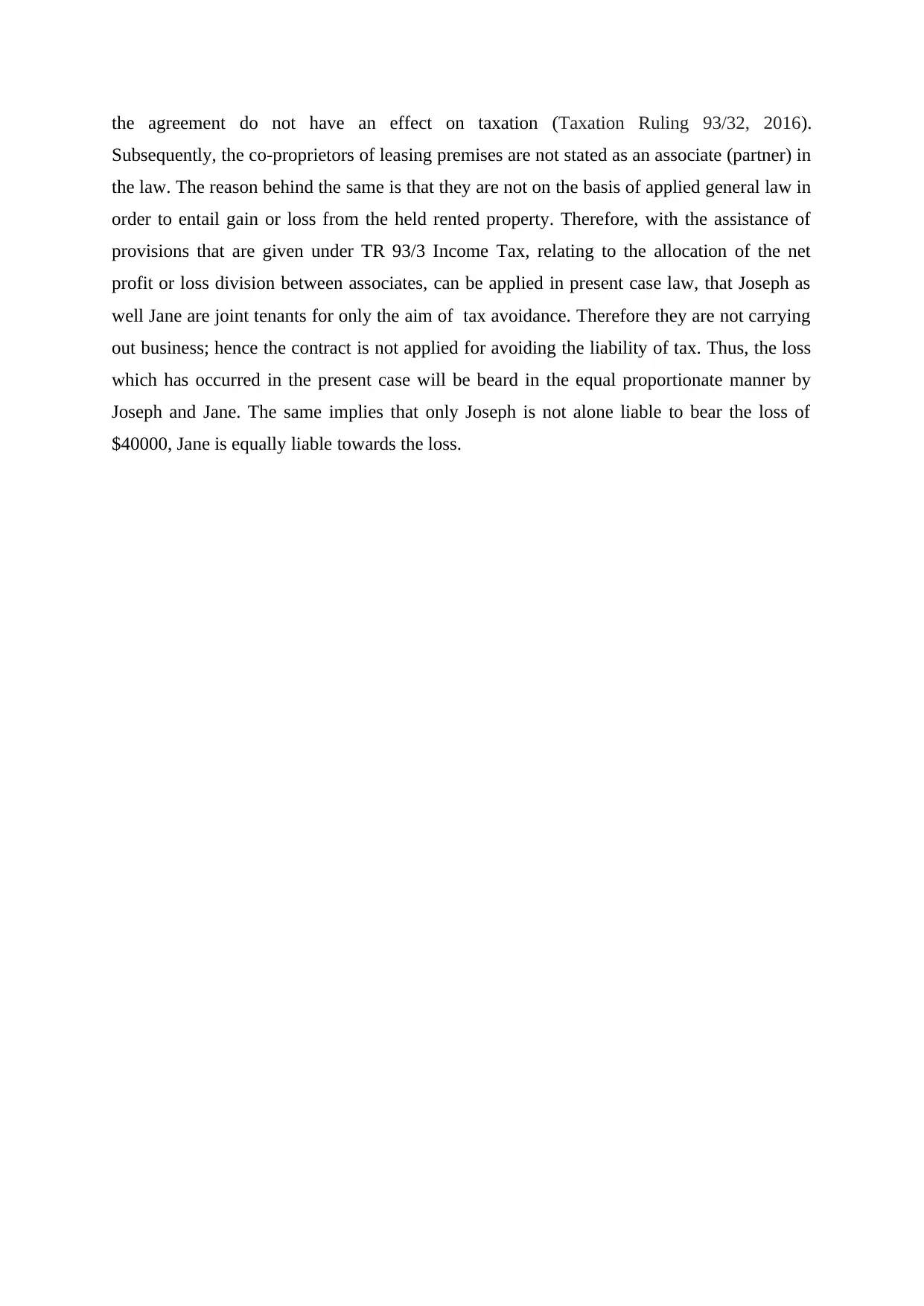
the agreement do not have an effect on taxation (Taxation Ruling 93/32, 2016).
Subsequently, the co-proprietors of leasing premises are not stated as an associate (partner) in
the law. The reason behind the same is that they are not on the basis of applied general law in
order to entail gain or loss from the held rented property. Therefore, with the assistance of
provisions that are given under TR 93/3 Income Tax, relating to the allocation of the net
profit or loss division between associates, can be applied in present case law, that Joseph as
well Jane are joint tenants for only the aim of tax avoidance. Therefore they are not carrying
out business; hence the contract is not applied for avoiding the liability of tax. Thus, the loss
which has occurred in the present case will be beard in the equal proportionate manner by
Joseph and Jane. The same implies that only Joseph is not alone liable to bear the loss of
$40000, Jane is equally liable towards the loss.
Subsequently, the co-proprietors of leasing premises are not stated as an associate (partner) in
the law. The reason behind the same is that they are not on the basis of applied general law in
order to entail gain or loss from the held rented property. Therefore, with the assistance of
provisions that are given under TR 93/3 Income Tax, relating to the allocation of the net
profit or loss division between associates, can be applied in present case law, that Joseph as
well Jane are joint tenants for only the aim of tax avoidance. Therefore they are not carrying
out business; hence the contract is not applied for avoiding the liability of tax. Thus, the loss
which has occurred in the present case will be beard in the equal proportionate manner by
Joseph and Jane. The same implies that only Joseph is not alone liable to bear the loss of
$40000, Jane is equally liable towards the loss.
⊘ This is a preview!⊘
Do you want full access?
Subscribe today to unlock all pages.

Trusted by 1+ million students worldwide
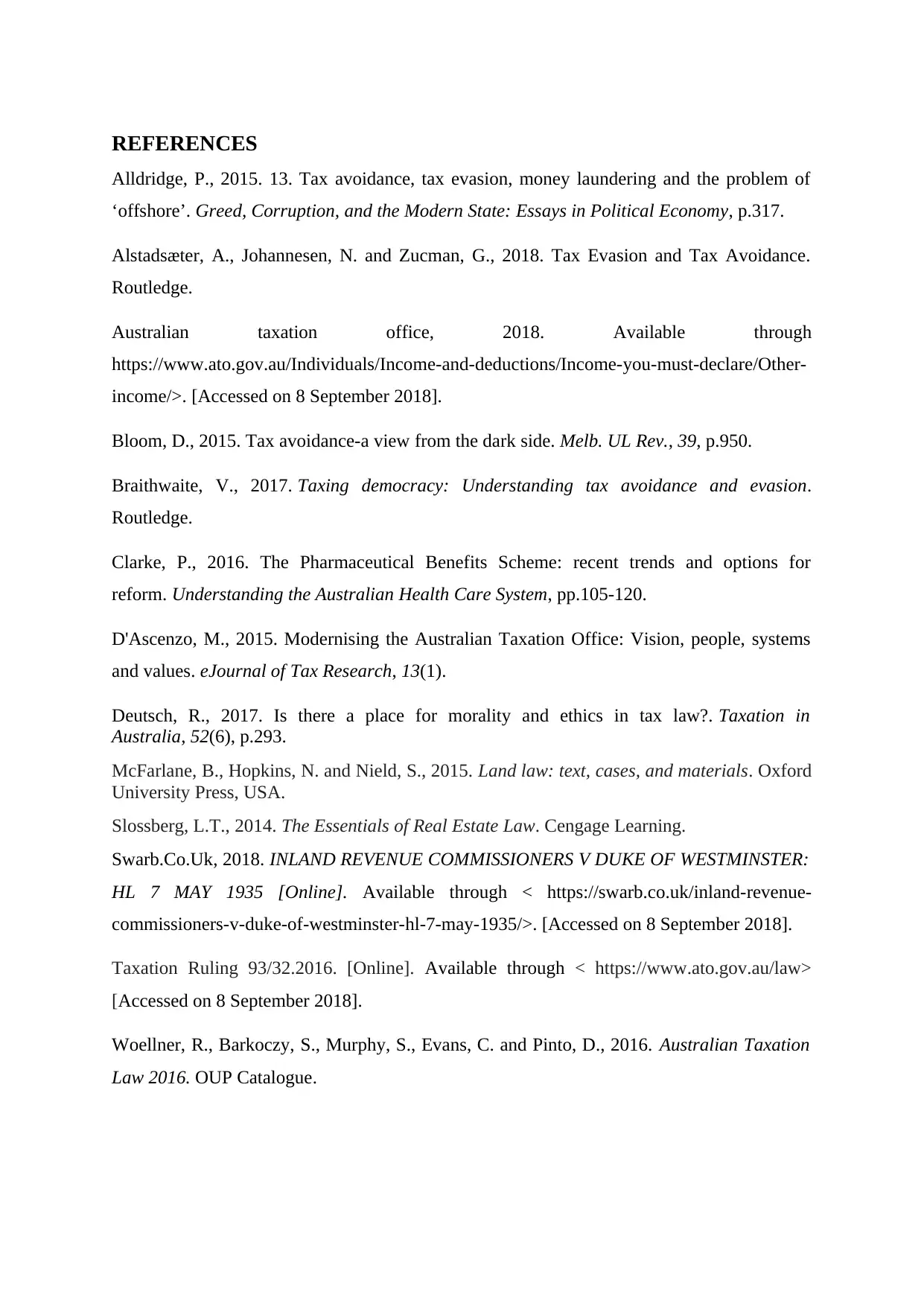
REFERENCES
Alldridge, P., 2015. 13. Tax avoidance, tax evasion, money laundering and the problem of
‘offshore’. Greed, Corruption, and the Modern State: Essays in Political Economy, p.317.
Alstadsæter, A., Johannesen, N. and Zucman, G., 2018. Tax Evasion and Tax Avoidance.
Routledge.
Australian taxation office, 2018. Available through
https://www.ato.gov.au/Individuals/Income-and-deductions/Income-you-must-declare/Other-
income/>. [Accessed on 8 September 2018].
Bloom, D., 2015. Tax avoidance-a view from the dark side. Melb. UL Rev., 39, p.950.
Braithwaite, V., 2017. Taxing democracy: Understanding tax avoidance and evasion.
Routledge.
Clarke, P., 2016. The Pharmaceutical Benefits Scheme: recent trends and options for
reform. Understanding the Australian Health Care System, pp.105-120.
D'Ascenzo, M., 2015. Modernising the Australian Taxation Office: Vision, people, systems
and values. eJournal of Tax Research, 13(1).
Deutsch, R., 2017. Is there a place for morality and ethics in tax law?. Taxation in
Australia, 52(6), p.293.
McFarlane, B., Hopkins, N. and Nield, S., 2015. Land law: text, cases, and materials. Oxford
University Press, USA.
Slossberg, L.T., 2014. The Essentials of Real Estate Law. Cengage Learning.
Swarb.Co.Uk, 2018. INLAND REVENUE COMMISSIONERS V DUKE OF WESTMINSTER:
HL 7 MAY 1935 [Online]. Available through < https://swarb.co.uk/inland-revenue-
commissioners-v-duke-of-westminster-hl-7-may-1935/>. [Accessed on 8 September 2018].
Taxation Ruling 93/32.2016. [Online]. Available through < https://www.ato.gov.au/law>
[Accessed on 8 September 2018].
Woellner, R., Barkoczy, S., Murphy, S., Evans, C. and Pinto, D., 2016. Australian Taxation
Law 2016. OUP Catalogue.
Alldridge, P., 2015. 13. Tax avoidance, tax evasion, money laundering and the problem of
‘offshore’. Greed, Corruption, and the Modern State: Essays in Political Economy, p.317.
Alstadsæter, A., Johannesen, N. and Zucman, G., 2018. Tax Evasion and Tax Avoidance.
Routledge.
Australian taxation office, 2018. Available through
https://www.ato.gov.au/Individuals/Income-and-deductions/Income-you-must-declare/Other-
income/>. [Accessed on 8 September 2018].
Bloom, D., 2015. Tax avoidance-a view from the dark side. Melb. UL Rev., 39, p.950.
Braithwaite, V., 2017. Taxing democracy: Understanding tax avoidance and evasion.
Routledge.
Clarke, P., 2016. The Pharmaceutical Benefits Scheme: recent trends and options for
reform. Understanding the Australian Health Care System, pp.105-120.
D'Ascenzo, M., 2015. Modernising the Australian Taxation Office: Vision, people, systems
and values. eJournal of Tax Research, 13(1).
Deutsch, R., 2017. Is there a place for morality and ethics in tax law?. Taxation in
Australia, 52(6), p.293.
McFarlane, B., Hopkins, N. and Nield, S., 2015. Land law: text, cases, and materials. Oxford
University Press, USA.
Slossberg, L.T., 2014. The Essentials of Real Estate Law. Cengage Learning.
Swarb.Co.Uk, 2018. INLAND REVENUE COMMISSIONERS V DUKE OF WESTMINSTER:
HL 7 MAY 1935 [Online]. Available through < https://swarb.co.uk/inland-revenue-
commissioners-v-duke-of-westminster-hl-7-may-1935/>. [Accessed on 8 September 2018].
Taxation Ruling 93/32.2016. [Online]. Available through < https://www.ato.gov.au/law>
[Accessed on 8 September 2018].
Woellner, R., Barkoczy, S., Murphy, S., Evans, C. and Pinto, D., 2016. Australian Taxation
Law 2016. OUP Catalogue.
1 out of 10
Related Documents
Your All-in-One AI-Powered Toolkit for Academic Success.
+13062052269
info@desklib.com
Available 24*7 on WhatsApp / Email
![[object Object]](/_next/static/media/star-bottom.7253800d.svg)
Unlock your academic potential
Copyright © 2020–2026 A2Z Services. All Rights Reserved. Developed and managed by ZUCOL.





